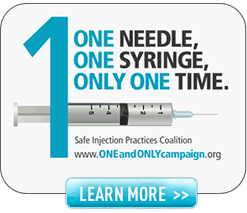Here’s the situation as we know it: as many as 30 residents, all 60 years old or older, who live at ManorCare Health Services in Ward County, North Dakota, have recently been found to be infected with the same strain of hepatitis C. Its suspected that some aspect of medical care is the cause of all of the cases.
It’s sad but true. And it happens all the time. There have been over 50 confirmed outbreaks of hepatitis C in the United States over the last 12 years. There have also been thousands of patient notification letters sent, after discovery that some aspect of the medical injection process was done improperly. Many times, there is no known disease transmission, which is a great relief for patients and their loved ones. But, oftentimes, there is.
Recently, in North Dakota, the health department sent letters to an additional 230 patients at ManorCare. They share healthcare patterns, so the North Dakota Department of Health and Human Services wanted to alert them they may have been placed in harm’s way. We appreciate their thoroughness.
Men and women throughout the country who receive these letters—and we know and love and work alongside many of them—confirm that receiving one of these letters is frightening. Patient notifications, while necessary, can also erode a community’s trust in its healthcare.
When a patient becomes a victim of healthcare associated infection caused by errors made during the injection process, the fear is elevated. Hepatitis C, particularly when a patient is suffering from one or more other diseases, is life threatening. Fortunately, treatment options are expanding and improving.
The first two parts of our HONOResponse program encourage the health department to notify all patients and encourage the patients to get tested (and, if they need to, start treatment immediately).
But there’s much more to HONOResponse. We are grateful to have had the opportunity to provide our program in a number of locations where there have been patient notifications or outbreaks—including Las Vegas, Oklahoma and New Hampshire.
In our experience, health department representatives, in tandem with the CDC, do their very best to respond to patient notifications and outbreaks. We admire their determination and skill. And we particularly admire epidemiologists, who often have to face the “gray area” that presents itself during outbreaks investigations. By that, I mean, the tough question, “What is the source of this patient’s infection?”
And this is exactly what is happening in North Dakota. Epidemiologists are working to determine how these infections occurred. From what health department representatives have told us, patients are being tested and receiving good and thorough care. Still, from our perspective, there is more that can be done.
The work we provide through our HONOResponse program is informed by patient advocates—men and women throughout the country who have received notification letters and who have been infected with bloodborne pathogens. And it’s led by patient advocate Evelyn McKnight, who is always willing to lend her voice and time to HONOResponse.
Among the many parts of HONOResponse, which can be customized to fit a community’s needs, are:
• Outreach to health departments;
• Outreach to patients/victims;
• Media outreach (op-eds);
• Hosting of and participation in community meetings and forums;
• “Compassionate Response Toolkit,” customized for patients and their caregivers;
• Ongoing support, through support groups and consultation.
To the patients in North Dakota, we offer our prayers and best wishes and offers of support.
Our primary aim is the elimination of outbreaks caused by lack of adherence to national injection safety standards. But, in the meantime, we are glad for the opportunity—which is a privilege and at the center of our mission—to help support patients and communities.


